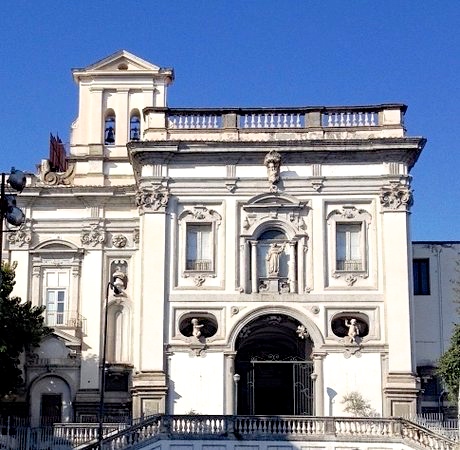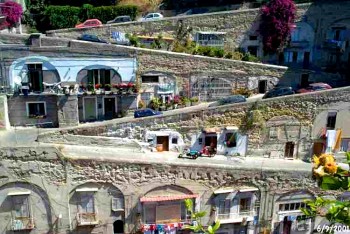“Lojacono…had remained in the apartment alone. It was something he always did, if at all possible. He was convinced that in certain situations something was left hovering in the air, like a particulate cloud of emotions, a tear in the surface of reality through which a barely noticeable stream flowed, disappearing entirely once the place became the Murder Scene.”
 With the latest entry in his crime series set in Pizzofalcone, a precinct high atop a hill in Naples, author Maurizio de Giovanni adds another layer to the characters who have made themselves so intriguing to readers of the previous four novels in this series. The police department in Pizzofalcone consists of outcasts from other police departments all over Italy, new officers who have replaced the original “Bastards of Pizzofalcone,” all but two members of which were dismissed for corruption. Each new member of the force has come with some kind of “baggage,” however, including, in the case of Lojacono, the false accusation by a low level crook that Lojacono was an informant for organized crime. Gradually, over the course of the series, Lojacono and his new partners find success in their jobs, and even come to like and trust each other.
With the latest entry in his crime series set in Pizzofalcone, a precinct high atop a hill in Naples, author Maurizio de Giovanni adds another layer to the characters who have made themselves so intriguing to readers of the previous four novels in this series. The police department in Pizzofalcone consists of outcasts from other police departments all over Italy, new officers who have replaced the original “Bastards of Pizzofalcone,” all but two members of which were dismissed for corruption. Each new member of the force has come with some kind of “baggage,” however, including, in the case of Lojacono, the false accusation by a low level crook that Lojacono was an informant for organized crime. Gradually, over the course of the series, Lojacono and his new partners find success in their jobs, and even come to like and trust each other.
 Known for his noir murder mysteries – and an additional series of nine novels set in Mussolini’s Italy, the broadly based Ricciardi series – author de Giovanni has mellowed since the first book in the Pizzofalcone series, The Crocodile. In that book, Lojacono, newly arrived in Naples from Sicily, identifies and removes a killer of young people in what is by far the darkest noir crime novel that de Giovanni has ever written. In The Crocodile, Lojacono is operating virtually on his own, with most of his new fellow officers convinced, wrongly, that the murders of young people are being conducted by the Camorra, the Neapolitan Mafia. Earning his stripes with his own work on that case, Lojacono develops a friendship with the new head of investigation, Laura Piras, from Sardinia, and begins to feel like part of the new group of police he has joined in Naples. The later mysteries in the series, including this one, give readers a chance to see the six-member team in action, with the characters becoming more fully developed and revealing their personal sides as they develop investigative talents and personal skills they never realized they had.
Known for his noir murder mysteries – and an additional series of nine novels set in Mussolini’s Italy, the broadly based Ricciardi series – author de Giovanni has mellowed since the first book in the Pizzofalcone series, The Crocodile. In that book, Lojacono, newly arrived in Naples from Sicily, identifies and removes a killer of young people in what is by far the darkest noir crime novel that de Giovanni has ever written. In The Crocodile, Lojacono is operating virtually on his own, with most of his new fellow officers convinced, wrongly, that the murders of young people are being conducted by the Camorra, the Neapolitan Mafia. Earning his stripes with his own work on that case, Lojacono develops a friendship with the new head of investigation, Laura Piras, from Sardinia, and begins to feel like part of the new group of police he has joined in Naples. The later mysteries in the series, including this one, give readers a chance to see the six-member team in action, with the characters becoming more fully developed and revealing their personal sides as they develop investigative talents and personal skills they never realized they had.
With a title like Puppies, this latest Pizzofalcone mystery sounds more like a “cozy” than a noir mystery. De Giovanni, however, is clever. He draws in readers with the action here, starting with the last thoughts of a dying woman, followed by a section in which two people are talking about leaving something – not identified as human or animal – outside in an alley where it will get noticed without delay. The novel then focuses on officer Romano, a hulk who has trouble controlling his temper. As Romano leaves for work, he passes garbage cans in the alley, just as a “broken doll” starts to cry. A newborn baby has been left with the trash. By the time the police get to the scene of the baby, Romano, in a panic, is trying to warm it and help it breathe. The baby has a serious infection, but Romano refuses to let her stay alone at night at the hospital. He is asked to give the baby a name so she will seem more “real” while in the hospital. No puppies are mentioned at all until about fifty pages into the book. Gradually, the reader comes to understand that “puppies” are symbolic of lives that cannot survive without help.

Santa Maria degli Angeli in Pizzofalcone.
As the search begins to find the mother of the baby, a different crime becomes a focus, the murder of a young Eastern European woman who has been working in Naples. Subplots galore emerge. A young boy, an immigrant from Sri Lanka, sees and approaches Aragona, the least popular officer of the Pizzofalcone group, the son of a wealthy family with political connections. The boy’s little dog has been stolen, and he is heartbroken. Though the officer has no interest in pets or immigrants, he takes some interest in the boy’s problem when he discovers that other small animals and pets throughout the city are also disappearing. Over the course of the novel, this officer, who is a lost cause in the previous three novels, becomes far more human than anyone would ever expect and makes changes in his life. At the same time, an elderly priest describes his personal goals regarding people without hope who end up as suicides, of which there are more than usual in Pizzofalcone. The oldest member of the police of Pizzofalcone is also investigating these suicides from a different angle. Complications in the love lives of several of the characters are another major focus at the end of the novel.

Aragona lives at the Hotel Mediterraneo where he enjoys breakfast and the attention of a young waitress.
Readers of Maurizio de Giovanni, whether they be of the Pizzofalcone series or the Ricciardi series or both, know well that the author’s focus throughout nearly all of his novels is on the human side of crime and the people involved in it. He is not afraid to show characters as they live their lives and deal with the conflicts between what’s “right” and what is legally correct. His characters are not geniuses – they are far more real and far more attuned to living a “good” life than to being correct. He sees the dark side, but he also sees and appreciates the wonders that sometimes happen when a character falls in love and suddenly discovers the joys of sharing a life. The author also has a tendency to include a little spiritual “magic” within dramatic circumstances at times of crisis. The opening quotation, in which Lojacono comments on the “tear in the surface of reality” which sometimes happens in the aftermath of a terrible event, might just as easily have been made by Commissario Ricciardi in the Ricciardi series. Ricciardi’s special talent is that he can “speak” to a murder victim if he visits the murder scene immediately after it happens. Dark crime sometimes does “speak” to those who want to help, as the reader learns here – but there is nothing “cozy” about it.
Also by de Giovanni: THE BASTARDS OF PIZZOFALCONE (Lojacono #2), THE BOTTOM OF YOUR HEART (Ricciardi #7) BLOOD CURSE (Ricciardi #2), BY MY HAND (Ricciardi #5), COLD FOR THE BASTARDS OF PIZZOFALCONE (Lojacono #4). THE CROCODILE (Lojacono #1), DARKNESS FOR THE BASTARDS OF PIZZOFALCONE (Lojacono #3), THE DAY OF THE DEAD (Ricciardi #4), EVERYONE IN THEIR PLACE (Ricciardi #3), GLASS SOULS: MOTHS FOR COMMISSARIO RICCIARDI (Ricciardi #8) , I WILL HAVE VENGEANCE (Ricciardi#1), NAMELESS SERENADE (Ricciardi #9), VIPER (Ricciardi #6)
Photos. The author’s photo appears on https://www.toulouse-polars-du-sud.com
One of Pizzofalcone’s famous “ramp roads” is shown on https://www.napoliflash24.it/
Santa Maria degli Angeli in Pizzofalcone, one of Italy’s beautiful, old churches. https://www.tripadvisor.it
Aragona lives at the Hotel Mediterraneo, where he enjoys breakfast and the attention of a young waitress. https://www.letsbookhotel.com

